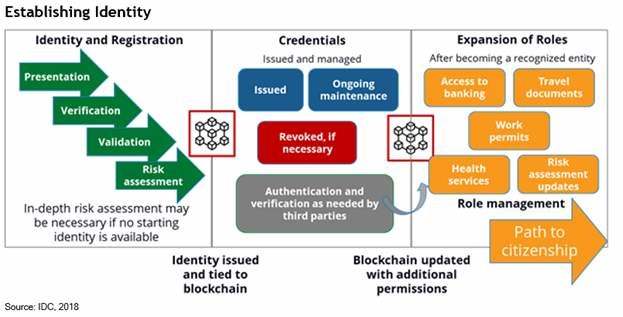Blockchain has landed – in a very solid way at government agencies. Both national and local governments are realizing Blockchain holds significant potential to disrupt current best practices for asset management, supply chain security and smart contracts.
But one of the most far-reaching functions may be “Self-sovereign Identity.”
Why a Self-Sovereign Solution Needed
The United Nations estimates 1.1 billion of the world’s 7.6 billion people possess no form of official identification. There are multiple reasons. Many people’s births are never ever documented, people’s identification is lost, or people have fled their countries and are now refugees.
In many countries, you can’t establish a bank account or find a full-time job without a proper government-issued ID. In many cases, refugees who have fled their homes lack any type of “valid” ID.
ID2020 Fills the Gap
The United Nations, working with Accenture, Microsoft, The Rockefeller Foundation, and Gavi (The Vaccine Alliance) has established a nonprofit identification effort known as ID2020. They support the UN goal of providing a widely recognized legal identity to everyone.
The prototype of the identity system is based on Enterprise Ethereum Alliance’s private blockchain technology. There is a refugee camp in Jordan already using this blockchain approach in multiple ways, including allowing participants to shop at a local grocery story, with their purchases billed to an account set up using their new ID.
This approach helps establish stepping stones for refugees to make their way out of such camps. By setting up financial accounts, each person has a place for a potential employer to deposit pay, and a way to pay their bills. This, in turn, helps a refugee establish a credit history for future loans. Eventually, any government that may wish to grant citizenship to refugees can check such histories to see blockchain-supported evidence – which can help support their decisions.
A goal is that refugees can leave camp with a record of their transaction history, plus a government ID and access to their newly established financial accounts.
The ID2020 organization has stated it’s important to base its solutions on open standards, and also open apps, in order to ensure vendor neutrality.
The Broader Realm of Digital Identity
Self-sovereign identity is a concept directly related to digital identity. It focuses the idea that individuals can store information about their digital identity in a location of their choice. Such information can then be provided to third parties as needed. With the development of advanced blockchain technologies decentralized identities can be based on systems that are not owned by a single provider.
Bottom line: You no longer need a government to provide you with an ID. You could, in theory, establish an independent identity that is recognized by other governments around the world, and you can still prove who you are even if your state-issued ID is revoked.
The figure below shows the basics of how the identity is granted. The issuing authority looks for whatever proof of identity they may be able to find. (There may be none.) Assessments are done and if appropriate, an identity is issued and tied to a blockchain entry. Other options are available from there.

About the Name – Avoid Confusion
It’s worth mentioning that that Self-sovereign identity has nothing to do with a different movement that’s known as “Sovereign Citizens.” Here’s the difference;
- The so-called sovereign citizen group is mostly made up of political critics and tax protesters. Their focus on a specific interpretation of what they view as common law, and believe they are not directly answerable to governments.
- Self- sovereign identity is about providing valid and traceable identities to those people in the world who may not have any such identity.
But despite naming conventions, we feel ID 2020 is one of the more interesting, yet also challenging, implementations of blockchains in use today.
Several additional blockchain use cases are outlined in a recent IDC document titled Blockchain Rising: Eight Real-World Government Use Cases That Help Accelerate Digital Transformation.
Also, Government agencies and systems integrators interested in learning even more about government blockchain may also want to watch this Webinar: Blockchain in Government: Important Emerging Use Cases



